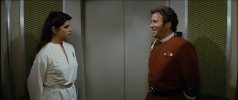somewhere there are fan arguments on whether Tyson's Cosmos is canon or not.If they'd prefer Cosmos, they'd better hide their faces behind their knees when Carl zips through space in his "Spaceship of the Imagination."
-
Welcome! The TrekBBS is the number one place to chat about Star Trek with like-minded fans.
If you are not already a member then please register an account and join in the discussion!
You are using an out of date browser. It may not display this or other websites correctly.
You should upgrade or use an alternative browser.
You should upgrade or use an alternative browser.
What are your controversial Star Trek opinions?
- Thread starter Amasov
- Start date
I think Star Wars was clearly aiming to incorporate a bit of fantastical stuff, right from the start. It never took itself seriously as a form of hard sci-fi, and nor did its fans. Star Trek - particularly in the TNG era - painted itself as sounding realistic, and a lot of fans bought into that. You rarely, if ever, heard talk in Star Wars of inverse polaron beams, or dynamic radiation, or tachyon emissions. Star Trek embraced technobabble, possibly with the aim of appearing credible.It's interesting that people don't hold up Star Wars to the same kind of scientific accountability that Star Trek seems to be expected to meet. Neither of them were ever intended to do that. Star Trek is a bit of 19th century gunboat diplomacy and western in a new atomic age wrapper. Star Wars is old 1930's Buck Rogers and Flash Gordon serials, with a few stolen ideas from Herbert and Asimov with better special effects.
gradually coalescing into the deflector dish becoming the Swiss Army Knife of plot points. How many new particles did Voyager invent during its run?I think Star Wars was clearly aiming to incorporate a bit of fantastical stuff, right from the start. It never took itself seriously as a form of hard sci-fi, and nor did its fans. Star Trek - particularly in the TNG era - painted itself as sounding realistic, and a lot of fans bought into that. You rarely, if ever, heard talk in Star Wars of inverse polaron beams, or dynamic radiation, or tachyon emissions. Star Trek embraced technobabble, possibly with the aim of appearing credible.
I so hope that this is the case.somewhere there are fan arguments on whether Tyson's Cosmos is canon or not.

I'm afraid to imagine! I'm pretty sure they were dining on kratatingtonlinear molecules by the end!gradually coalescing into the deflector dish becoming the Swiss Army Knife of plot points. How many new particles did Voyager invent during its run?
I prefer supercalifragilisticexpialaverteron particles!
Sounded good whenIt may be considered controversial, on the other hand maybe not, but I've never considered Star Trek to be a great franchise for scientific accuracy. Sure, the shows often dress up technology and terms with realistic-sounding expressions, but when you pause, and really dig into the tech, Star Trek is better at sounding realistic, without actually being realistic. It's inspired people to take up an interest in science, which is great, but that doesn't mean we should confuse it with a scientifically-accurate set of shows. This has been a long-standing misunderstanding of the franchise, going way back to TOS.

A "bit"? It's the story of a wizard enlisting a young hero to rescue a princess from an evil sorcerer's haunted castle! It was a fairytale with space trappings.I think Star Wars was clearly aiming to incorporate a bit of fantastical stuff, right from the start.
I LOLed.
But, wait, is that real*?
* - real as in not something you just made

It may be considered controversial, on the other hand maybe not, but I've never considered Star Trek to be a great franchise for scientific accuracy. Sure, the shows often dress up technology and terms with realistic-sounding expressions, but when you pause, and really dig into the tech, Star Trek is better at sounding realistic, without actually being realistic. It's inspired people to take up an interest in science, which is great, but that doesn't mean we should confuse it with a scientifically-accurate set of shows. This has been a long-standing misunderstanding of the franchise, going way back to TOS.
I don't think Star Trek was ever seen as realistic in how it uses science and tech. More along the lines that it was inspirational. Lots of of people got into science and space stuff because of their love for Star Trek.
While I’m fine with comic book science, sure, I wouldn’t mind them at least pulling back enough that I (a non-scientist) no longer have to sometimes sit there grumbling about it how it doesn’t work that way!…Okay, here is a new controversial opinion:
Star Trek should again pretend more that it is hard-SF.
I mean we all know it isn't.
But since 2009, modern Trek really operates on comicbook-understanding of science fiction concepts like parallel universes, black holes, time-travel etc.
So much so, that in a recent episode of SNW (which I love), a reality-shifting ancient temple was a subplot in an energy-being possession plot.
I miss the days when space documentaries used shots from Star Trek or had Leonard Nimoy as guest, pretending to know what he's talking about, and in general the more "fantastic" story elements like time-loops or wormholes being more thoroughly explained by Geordi LaForge, with colourful graphs & referencing scientists' names, instead of just being accepted as common knowledge as part of pop culture.
Why, when the whole point of the Ship of the Imagination is that it’s imagination, not a literal ship one could build. That’s specifically what it’s there for in Cosmos.If they'd prefer Cosmos, they'd better hide their faces behind their knees when Carl zips through space in his "Spaceship of the Imagination."
We try. Sometimes. Things like a working lightsaber are pretty hard to see as realistic. There was some bitching about the Galaxy Gun, I mean Starkiller Base.It's interesting that people don't hold up Star Wars to the same kind of scientific accountability that Star Trek seems to be expected to meet.
But how they keep getting away with spaceships making it to other star systems without hyperdrive is beyond me.
Here is a controversial opinion. I like season 1 Bashir on DS9. I enjoyed that the character had something or a arc. He started off being brash and constantly wanting to get with Jadzia and being annoying to people but I liked that about him. It's fun contrast to watch the show and see where he started and how he changed. Not only that but he went from having O'Brien dislike him to being best friends. He went with wanting to get with Jadzia to becoming friends to falling in love with Ezri Dax instead of Jadzia.
Sorry just me making a shitpost. But yeah Tyson had some involvement in the Pluto decision. He made a funny documentary about it.I LOLed.
But, wait, is that real*?
* - real as in not something you just made
Yeah, thing is the joke has to work…
Since 2009? Try 1965. Comics and Star Trek are the children of the pulps. Big headed telepathic aliens, human-alien hybrids and space empires are very comicbooky. Comics like to layer on the real science too.But since 2009, modern Trek really operates on comicbook-understanding of science fiction concepts like parallel universes, black holes, time-travel etc
Last edited:
As I implied... it was a little joke... not any better... and certainly not any worse... than Kirk's in that scene. That's Kirk... laughing at his own lame joke... and he's the only one in the elevator laughing. Get it?Yeah, thing is the joke has to work…
My goodness, tough room!
Similar threads
- Replies
- 60
- Views
- 12K
- Replies
- 4
- Views
- 501
- Replies
- 47
- Views
- 6K
If you are not already a member then please register an account and join in the discussion!


